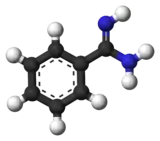Benzamidine
Benzamidine is the organic compound with the formula C6H5C(NH)NH2. It is the simplest aryl amidine. The compound is a white solid that is slightly soluble in water. It is usually handled as the hydrochloride salt, a white, water-soluble salt.[1]
 | |
 | |
| Names | |
|---|---|
| IUPAC name
Benzenecarboximidamide | |
| Identifiers | |
3D model (JSmol) |
|
| ChEBI | |
| ChEMBL | |
| ChemSpider | |
| ECHA InfoCard | 100.009.589 |
| KEGG | |
PubChem CID |
|
| UNII | |
CompTox Dashboard (EPA) |
|
| |
| |
| Properties | |
| C7H8N2 | |
| Molar mass | 120.155 g·mol−1 |
| Appearance | white solid |
| Density | 1.22 g/cm3 |
| Melting point | 78–80 °C (172–176 °F; 351–353 K) |
Except where otherwise noted, data are given for materials in their standard state (at 25 °C [77 °F], 100 kPa). | |
| Infobox references | |
In terms of its molecular structure, Benzamidine features one short C=NH bond and one longer C-NH2 bond, respectively 129 and 135 picometers.[2]
Applications
Benzamidine is a reversible competitive inhibitor of trypsin, trypsin-like enzymes and serine proteases.[3]
It is often used as a ligand in protein crystallography to prevent proteases from degrading a protein of interest; the triangular diamine group at the bottom gives it a very obvious 'stick-man' shape which shows up in difference density maps. The benzamidine moiety is also found in some pharmaceuticals, like dabigatran.
References
- Bryan Li, Charles K-F Chiu, Richard F. Hank, Jerry Murry, Joshua Roth, Harry Tobiassen (2005). "Preparation of 2,4-Disubstituted Imidazoles: 4-(4-Methoxyphenyl)-2-Phenyl-1H-Imidazole". Organic Syntheses. 81: 105. doi:10.15227/orgsyn.081.0105.CS1 maint: uses authors parameter (link)
- Barker, J.; Phillips, P. R.; Wallbridge, M. G. H.; Powell, H. R. (1996). "Benzamidine". Acta Crystallographica Section C Crystal Structure Communications. 52 (10): 2617–2619. doi:10.1107/S0108270196006282.
- Tanizawa, Kazutaka; Ishii, Shin-ichi; Hamaguchi, Kazo; Kanaoka, Yuichi (1971-05-01). "Proteolytic EnzymesVI. Aromatic Amidines as Competitive Inhibitors of Trypsin". The Journal of Biochemistry. 69 (5): 893–899. doi:10.1093/oxfordjournals.jbchem.a129540. ISSN 0021-924X. PMID 5577153.